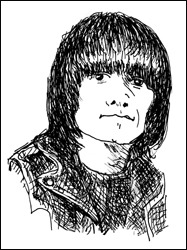

Punk was many things, including a reaction to awful music like the hideous elf rock of Yes and the intolerable countrified coke droning of the Eagles, but it was also an art movement spearheaded by low-rent bands in shit clubs. Punk was misunderstood at the time because the American press fixated on the spitting and the safety pins and missed the whole idea that young people hated how boring society had become, loathed the government and the crappy economy, plus the fact that pop music was not getting it done.
Conceived and recorded very quickly and with little to no Sid Vicious, who could not actually play his bass, this album is a snarling, raging, caterwauling triumph. Johnny (then) Rotten barks and yelps and whines and is everything rock needs to rock. Thirty-some odd years down the road, this album, with its opening of marching jackboots, is still snotty. “God Save the Queen” is a hate-packed rant that feels good on every listen. “We mean it, maaaaaan.” The song “Bodies” says it all: “Fuck this and fuck that.” Name another group that made only one album that is still being spoken of. They defined punk and could not sustain because of business and money and drugs and violence. They wrote but one book, but it is a rockin’ good time.
The Clash had been there at the start of punk and wanted to make an album that had everything but the kitchen sink: rhythm & blues, reggae, ska, lounge, horns, rockabilly, rock ’n’ roll, punk, and plenty of anger and dread. And why not? The Sex Pistols were long gone, and punk was morphing into art, techno, industrial, and new wave. The producer was a gifted, drug-taking drunk named Guy Stevens, who brought Chuck Berry to the UK after he was arrested for taking a fourteen-year-old girl across state lines, and started Mott the Hoople and gave them their name. London Calling, with its cover art inspired by Elvis’s first album, was the title of a book Stevens read in jail. While the first Clash album sounds like machine guns and barking seals, London Calling was an attempt to commercialize them and smooth out the punk. The Clash put down a lot of tracks in one take and made the album in a big hurry. It is a sprawling and slightly disorganized record; the hit “Train in Vain” ain’t even listed on the album, after a promotional deal fell through. But it has an immediate party feel that is so infectious it covers the mistakes and erratic tempo changes. As Guy Stevens said, “All great rock songs speed up.” Light one up before breakfast and stop being so rude and feckless; this record is a call to arms—and shows that pretentious political bands can have fun, too. Dear U2, please take note.

Four dysfunctional dudes from New York who loved comic books, sci-fi, baseball, and old-fashioned rock ’n’ roll created the greatest art project that rock ever had. The group that defined the look and shred of punk. The Ramones had unity, short buzz-saw songs, the same haircut, leather jackets, ripped jeans, and tennis shoes. The inspired mixture of Beach Boys riffs, drug references, poverty, and nonstop, no solos, maximum rock ’n’ roll without the macho bullshit and pretend bluesiness of heavy metal. It is the funniest album about mental illness you will ever rock out to.